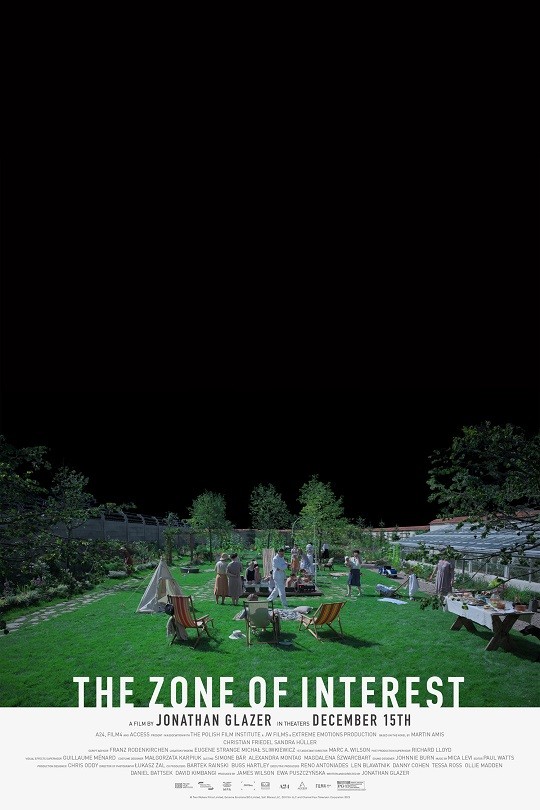The Zone of Interest
Introduction
About 6 million Jews were killed in the Holocaust, and while I let you sink in that detail, has anything changed today? With that, I finished watching the much awaited German film The Zone Of Interest which is nominated in not one but two huge categories at the Academy Awards this year – Best Picture and Best Foreign Language Film while being United Kingdom’s Official Submission to the Oscars. This in every sense of the word was a huge film, being keenly awaited by cinephiles across the globe. I was reading a little about its premise which instantly seemed interesting and took me to the films showcasing Holocaust which was probably the darkest chapter in human history. So many Jews were spied upon before being sent to the concentration camps and killing them off but the beautiful part about History is that it always allows you to learn from it. The question though remains – Have we as a human race learnt from the past and evolved as human beings? The answer is contentious but with the twin wars being fought across the globe and with several innocent people dying and the refugee crisis on the rise, the answer is a resounding no. Even if we were to put the wars aside, how many of us are actually being empathetic towards the suffering of others? These are some burning questions to ponder upon as I ventured into the film The Zone Of Interest. So then does The Zone Of Interest manage to impress, let’s find out.
Story & Screenplay
The Zone Of Interest follows the story of the commander of Auschwitz(a Jewish concentration camp), Rudolf Hoss who builds his dream home and resides with his family right next to the concentration camp. The story here is absolutely gut-wrenching in a unique manner, simply because it splits the technicalities of sight and sound to present a haunting imagery of the past while also comparing it to modern times. This, while the question remains – Have we evolved as a race? There have often been questions raised on how Nazis would go to bed knowing that they are responsible for so many deaths including children. And through the course of the screenplay standing at just 100 odd minutes, you do get a glimpse into their mundane lives while they look through the pain and suffering of others by almost creating a ‘wall’ around them. This section will contain spoilers.
The drama sticks closer to historical facts featuring the commander Hoss as you are introduced to him and his family who spend quality time with each other during the lake side while living in their dream home right next to the concentration camp. We get a closer insight into their lives that are mundane, often reduced to casual talks in their garden, planning the killing of some more Jews(by an energentic commander) or conversations that you would have at home which is different from screaming, shooting and metal clanging sounds that appear in the background, emerging from the concentration camp next door separated by a wall. This ‘wall’ was symbolic of the shield created by the Hoss family who are immune to the sounds which would otherwise have a stirring impact on beings. But the writers do exactly this – show a reflection of the society that we live in even today!
The decision to split the sight and sound of the film does result in two different dramas of different tonalities unfolding together. So the beautiful and calm visuals of the garden and cut through by some frightful sounds of screaming and gunshots while addressing an important question on how would Nazis sleep at night while being aware of their actions. And the closer you look, the closer you realise that we as a human race are tilted towards the Nazis(may or may not be as cruel) while totally overlooking the people suffering – be it in war or also on streets outside our homes. And this was the kind of impact intended by the makers while comparing the Holocaust with the current times through symbolism and references.
Yet, there is a human tendency to feel the pain in its purest form that emerges in even the most unflinching individuals. And the same is represented through an Infra-Red sequence involving a girl hand-picking food items and hiding them at the work site of the Jews, for them to find the items and eat them. This did unfold against the story of Hansel and Gretal which did impart a lesson of working together to get out of a difficult situation(isn’t that for humanity stands for?). Elsewhere, one of the children of the Hoss household may not have had any context of things transpiring next door in the camp, but he could sense something amiss while being a loner and not responding to talks around. The character of the grandmother being heavily affected by the actions around her, leaves the household too while writing a letter to her daughter which she burns off. These were smaller instances that showcased hope in the most unlikely situations.
But seldom has there been an ending that has moved me to the core, so much so that it has been pondering long after the film is over. And I shall do my bit to explain it. In the final act, you see the character of Hoss being transferred to his original home next to the camp(after previously moving out) in order to ‘take care of 7000 Jews’ who are freshly transported to the concentration camps. Hoss at this stage in his life is well settled while returning to his family that he really loved and missed. Yet, in a stellar staircase sequence you see him retching twice, an action that briefly showcased his guilt. The drama cuts to the current times with a bunch of people cleaning the parts of the concentration camp which has now turned into a museum. Here, you see a huge pile of shoes and clothes of the Jews dead during the Holocaust that absolutely leaves you numb. The camera again cuts to Hoss as he makes his way into darkness representing Hell while realising that it is too late to turn back and the legacy that the world would remember him for. This screenplay was a writing masterclass that was in many ways different from the other films tackling Holocaust. It dared to transport you in the era while acting as a mirror for the society that we live in, even today.
Dialogues, Music & Direction
I usually add separate mentions for the lines, visuals and the BGM but here I shall be combining the two. The creative decision to split the sight and sound does result in a starkly different examination of the highest order. The lines were are casual signifying the mundane lives of the Hoss Family, unaffected by the shrieks and sounds emerging from the concentration camp next door that paints a completely different picture. The sound design is haunting and uncompromising that would instantly leave you numb and extremely affected. This is in contrast to the wide frame shots that capture the calm visuals of the surroundings, almost reflecting on what man chooses to see versus what he wants to ignore.
The visuals also include long periods of a black screen that represents hell, one to begin with that alerts the viewers on things to follow and the other to end it while we all find ourselves in hell. In between, the frame of red representing death was sudden and added to the shock element of the film almost provoking you to be guilty. The editing is crisp and sharp while allowing the drama to create a resounding impact. Director Jonathan Glazer does a magnificent job in creating a drama that is unassuming on the eye while leaving a resounding impact by the end of it. The direction is so powerful, almost allowing you to be a fleeting visitor in the Hoss household while coaxing you to look within you on your action in the current world. Hindsight is a beautiful place to be politically correct but our actions today would often define our future, and that was well highlighted by the maker here.
Performances
The performances are unflinching and spot on by the cast here. Sandra Huller(having the time of her life with two nominations this year, the other one being Anatomy Of A Fall) as Hedwig is wonderfully restrained, almost remaining immune to the chaos outside her home. And her character typically represents most of us, who have the tendency to throw opinions about the ones suffering from the luxury of our homes while doing nothing to curtail it. Thereby the immunity was equally startling but not quite given the situation of current times. Christian Friedel as Rudolf Hoss is often stoic and a man of few expressions that reflects a sense of disconnect with the reality he lives in. But somewhere within him is a sense of remorse while realising that it might be too late. And this was a brilliantly portrayed act keeping the vulnerabilities of the character deep within himself while reflecting the persona of most of us in current times.
Conclusion
Nominated for ‘Best Picture’ and United Kingdom’s Official Submission tonthe Academy Awards this year(and in the Final 5), The Zone Of Interest is a haunting and unsettling comparison of the Holocaust with the current times that is nothing short of a modern day masterpiece(and I only sparingly use this word). This drama is highly highly recommended from my end and perhaps my front runner at the Academy Awards for the Best Foreign Language Film this year.




